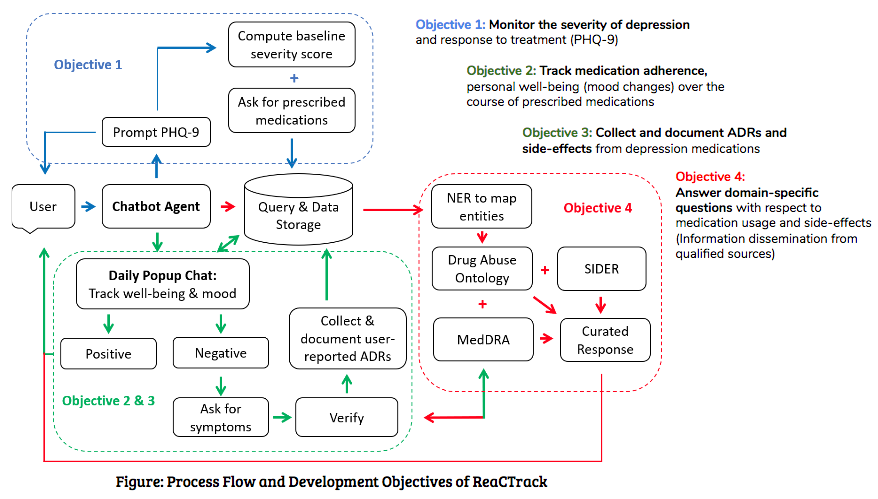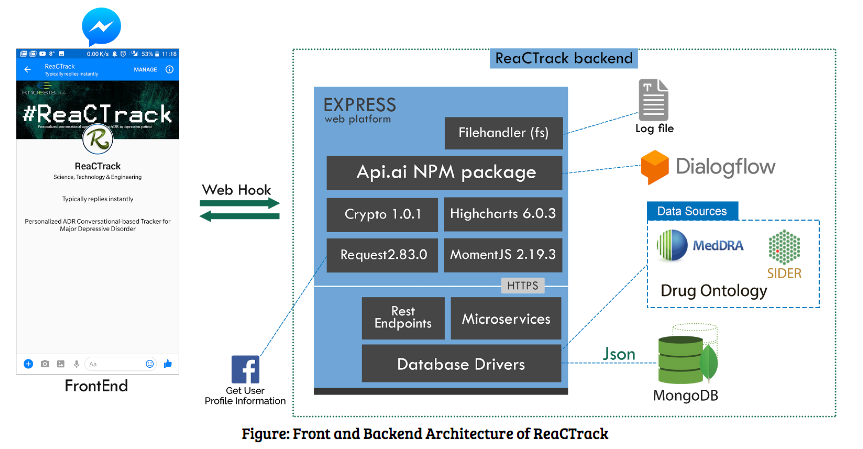ReaCTrack
ReaCTrack is the acronym for Personalized Adverse Reaction Conversational-based Tracker for Clinical Depression. This is an interdisciplinary project in applying conversational Artificial Intelligence (AI) for personalized healthcare. The objective of ReaCTrack is to monitor and keep track of personal well-being and depressive symptoms of patients diagnosed with mental health disorders, with the overall goal of delivering personalized and efficient behavioral or medical interventions. It is a spin off project of Depression.
People
Motivation and Background
Clinical depression is a common mental illness worldwide. It is the leading cause of disability worldwide, and is a major contributor to the overall global burden of disease. In United States, with over $40 billion has been spent each year on depression treatment [1]. Treatments for clinical depression include psychotherapy and antidepressant medication, but the effectiveness of treatment varies between different individuals [2]. As such, tailoring an effective treatment for depression patients is challenging even for experienced clinicians. The challenge is even complicated more by one of the persistent healthcare problems that is often associated with depression, medication nonadherence [3, 4, 5].
Medication adherence is defined as “the extent to which a patient acts in accordance with the prescribed interval, and dose of a dosing regimen” [6]. Medication nonadherence is one of the persistent healthcare problems and can (i) cause adverse health effects on patient’s health, potentially (ii) skew results of clinical therapy trials, and (iii) increase health resource consumption [7, 8]. According to American Medical Association (AMA), depression is one of the top 8 reasons for intentional medication nonadherence. The odd of depressed patients do not adhere with medication schedule is 3 times greater compared with those non-depressed patients [4]. Lack of symptom, describing a condition where patients do not experience any improvement after taking medication, while being a challenge for clinicians to deliver effective depression treatment, at the meantime also represents another reason of medication nonadherence2.
As if the problem is not complicated enough, medication side effects further complicates the situation. Side effects, commonly known as adverse drug reactions (ADRs), has been identified by The U.S. Food and Drug Administration (FDA) as one of the leading causes of death in the healthcare industry and identified by AMA as one of the top 8 reasons for medication nonadherence2. Thus, clinicians are strongly suggested to understand and recognize potential side effect, while educating patient with correct information to prevent any medication nonadherence and improve treatment outcome [9]. These four factors (depression, varying effectiveness of depression treatment, medication nonadherence and ADRs) intertwine in a complex relationship, mutually affect and exacerbate each other. It is important for clinicians to address these and deliver interventions in a timely manner.
Vision
ReaCTrack is a conversational agent, designed to actively engage with patients with the format of brief conversation daily. During the conversation, ReaCTrack collects and analyzes the messages. Through different analysis using machine learning (ML) and natural language processing (NLP), ReaCTrack extracts relevant information that is crucial to address the following issues:
- real-time monitoring of patients’ medication adherence and stores adherence record
- tracks mood change of depressed patients
- assesses medication effectiveness on a particular patient
- detects potential ADRs of antidepressant drugs
Infrastructure
Architecture
References
[1] Craft, Lynette L., and Frank M. Perna. "The benefits of exercise for the clinically depressed." Primary care companion to the Journal of clinical psychiatry 6.3 (2004): 104.
[2] Rothschild, Anthony J. "Challenges in the treatment of major depressive disorder with psychotic features." Schizophrenia bulletin 39.4 (2013): 787-796.
[3] Wang, Philip S., et al. "Noncompliance with antihypertensive medications." Journal of general internal medicine 17.7 (2002): 504-511.
[4] DiMatteo, M. Robin, Heidi S. Lepper, and Thomas W. Croghan. "Depression is a risk factor for noncompliance with medical treatment: meta-analysis of the effects of anxiety and depression on patient adherence." Archives of internal medicine 160.14 (2000): 2101-2107.
[5] Gonzalez, Jeffrey S., et al. "Depression and HIV/AIDS treatment nonadherence: a review and meta-analysis." Journal of acquired immune deficiency syndromes (1999) 58.2 (2011).
[6] Cramer, Joyce A., et al. "Medication compliance and persistence: terminology and definitions." Value in health 11.1 (2008): 44-47.
[7] Knight, Eric L., et al. "Predictors of uncontrolled hypertension in ambulatory patients." Hypertension 38.4 (2001): 809-814.
[8] Vlasnik, Jon J., Sherry L. Aliotta, and Bonnie DeLor. "Using Case Management Guidelines to enhance adherence to long-term therapy." The Case Manager 16.3 (2005): 83-85.
[9] Khawam, Elias A. Laurencic, G., and Malone, Donald A. Jr. "Side effects of antidepressants: an overview." Cleveland Clinic Journal of Medicine 73.4 (2006): 351.

